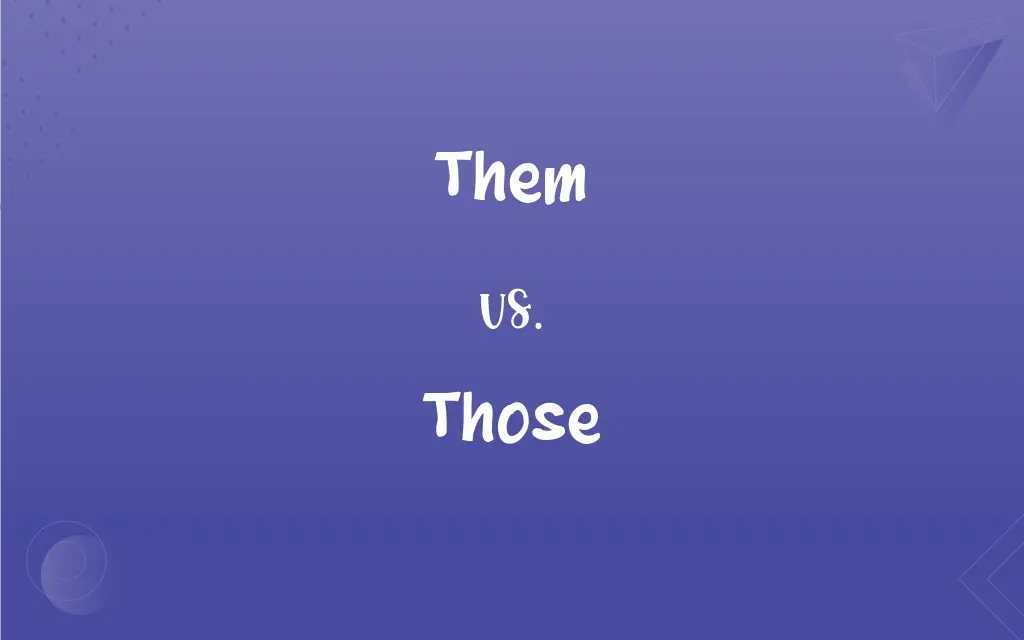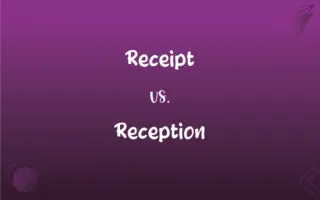Them vs. Those: What's the Difference?
Edited by Aimie Carlson || By Harlon Moss || Updated on November 7, 2023
"Them" is a pronoun referring to a specific group of people or things; "those" is a demonstrative adjective or pronoun specifying distant or distinct items.

Key Differences
"Them" functions as an object pronoun that is used to refer to a group of people or things previously mentioned or easily identified. It does not indicate location, proximity, or distance, but rather it serves as a grammatical necessity to replace the object of a sentence. "Those" is used as a demonstrative pronoun or adjective, pointing to a specific group of people or things that are distant from the speaker or less immediate in the context.
"Them" does not tell us anything about the location or distance of the people or things it refers to, but "those" implies a certain separation in space or distinction in a group. For example, when you say, "I have read books, and I enjoyed them," "them" refers to the books without indicating their proximity. Conversely, if you say, "I have read those books," "those" suggests the books are not physically close to the speaker.
Both "them" and "those" can function to give information about plurality, but "them" is always a pronoun, replacing the noun, while "those" can be a pronoun or an adjective. For instance, "them" is used like this: "She gave them to me yesterday." Here, "them" replaces the plural noun. "Those" can be used as in, "Those were the best days of my life," where "those" stands in for the noun it represents.
Using "them" is a way to refer to a group without specifying which members are being talked about, thus it is more general. "Those," on the other hand, is specific and selective, often accompanied by a gesture or indicator that points out exactly which objects or individuals are being discussed, such as in "Look at those stars in the sky."
In spoken English, "them" can sometimes be heard in non-standard forms such as "them books," which is dialectal and not grammatically correct. Standard English always uses "those" as the proper form before a noun, for example, "I will never forget those words." Thus, "those" keeps its form whether used as an adjective or pronoun, whereas "them" is
ADVERTISEMENT
Comparison Chart
Part of Speech
Pronoun
Demonstrative pronoun or adjective
Function
Replaces the object of a sentence
Specifies and points out a particular group
Proximity
Neutral, doesn't indicate distance
Indicates distance or distinction
Usage with Nouns
Does not directly precede a noun
Can precede a noun when used as an adjective
Grammatical Number
Always plural
Always plural
ADVERTISEMENT
Them and Those Definitions
Them
Used as the object of a verb or preposition.
The teacher gave them the books.
Those
Functions as a pronoun replacing a noun that has been mentioned.
I like these apples, but I don't like those.
Them
Occasionally used informally in place of 'those' in dialectal speech.
Look at them ducks over there.
Those
Sometimes implies a contrast with a closer or more immediate set.
These cookies are fresh, but those are stale.
Them
A substitute for the names of people or things.
I made cookies; do you want to try them?
Those
Specifies a particular set of items distant from the speaker.
Those mountains are beautiful.
Them
Can imply the objects or individuals in a non-specific manner.
I don't trust them as much as I used to.
Those
Used as an adjective to describe specific nouns.
Those children are playing soccer.
Them
Refers to a previously mentioned group.
Ask them if they are coming to the party.
Those
Can indicate a previous time or situation.
Those were the good old days.
Them
Those
"Them dogs will find the end of them footprints before ten o'clock" (William Faulkner).
Those
Plural of that
Those bolts go with these parts.
Them
(in the plural) Those ones.
Those
Plural of that
Those who serve [those persons who serve]
Don't touch those [those objects over there]
Them
Used as the direct object of a verb.
She treated them for a cold.
Those
The plural of that. See That.
FAQs
Can "those" be used to refer to time periods?
Yes, "those" can refer to past times or situations.
Can "them" start a sentence?
Typically not, as "them" is an object pronoun and not a subject pronoun.
Is "those" used for people and things?
Yes, "those" can refer to both people and objects.
Is "them" used in formal writing?
Yes, "them" is appropriate in formal writing as an object pronoun.
Can "them" be used for singular nouns?
No, "them" is always plural.
Are "them" and "those" interchangeable?
No, they serve different grammatical purposes.
Can "them" refer to something specific?
"Them" can refer to a specific group but does not indicate distance or separation.
Is "those" used only for objects far away?
"Those" indicates objects that are distant or figuratively separated from the current topic.
Do "them" and "those" mean the same thing?
No, they have different functions and meanings.
Is it grammatically correct to say "them ones"?
No, the correct phrase is "those ones."
Does "them" have different forms?
No, "them" does not change form.
Does "those" have an equivalent singular form?
Yes, "that" is the singular equivalent of "those."
How do I decide whether to use "them" or "those"?
Use "them" as a pronoun to replace a plural noun's object. Use "those" to indicate specific distant objects or to distinguish a particular group.
Are "them" and "those" used in the same context?
They can refer to similar entities but are used differently grammatically.
Can "them" be used to emphasize a point?
Not typically; "them" is neutral and does not provide emphasis.
Is "them" considered less formal than "those"?
Not inherently, but incorrect usage of "them" can be informal.
Is "those" more specific than "them"?
Yes, "those" is often more specific and indicates particular items.
Does "those" always indicate physical distance?
Not always; it can also indicate figurative distance or distinction.
Can "those" be used without a noun following it?
Yes, "those" can stand alone as a pronoun.
Can "those" be used to show disapproval?
Yes, "those" can imply disapproval, especially when said with a certain tone.
About Author
Written by
Harlon MossHarlon is a seasoned quality moderator and accomplished content writer for Difference Wiki. An alumnus of the prestigious University of California, he earned his degree in Computer Science. Leveraging his academic background, Harlon brings a meticulous and informed perspective to his work, ensuring content accuracy and excellence.
Edited by
Aimie CarlsonAimie Carlson, holding a master's degree in English literature, is a fervent English language enthusiast. She lends her writing talents to Difference Wiki, a prominent website that specializes in comparisons, offering readers insightful analyses that both captivate and inform.






































































